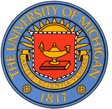Professor Chihiro Kikuchi earned a B.S. degree in Physics at the University of Washington in 1939. He went on to graduate work in mathematics at the University of Cincinnati and received a Master's degree in 1943. He returned to the University of Washington to pursue a doctoral degree in Physics, which was granted in 1944.
His academic career has included appointments as instructor at Haverford College and Michigan State University, and professorial appointments at Michigan State University and The University of Michigan. He began his career in Ann Arbor in 1955 as an associate research physicist with the Willow Run Laboratories of the University. His career at Willow Run included advancement to the position of Head, Solid State Physics Group, in 1958. During this time, Professor Kikuchi was instrumental in the invention and development of one of the most significant solid-state devices of our time-the ruby maser. This device was an important precursor for the development of the optical laser, and remains an important element in the amplification of microwave signals to this date. Professor Kikuchi's original contributions have been recognized by the Smithsonian Institution through their establishment of a permanent exhibit that acknowledges his invention of the ruby maser.
In 1959, he joined the teaching staff of the Department of Nuclear Engineering. His research continued in the area of solid-state physics, radiation effects in materials, and fundamental aspects of material science. More recently, his interests have included public policy issues in the development of nuclear energy and the international aspects of energy resource development. His many technical accomplishments have been recognized by his elevation to Fellow status in both the American Physical Society and the American Nuclear Society.
Professor Kikuchi is contributing author or co-author for three books. His publication record also includes over 80 technical articles in various journals and conference proceedings. By any measure, his technical accomplishments and teaching record at the University have been truly outstanding.




